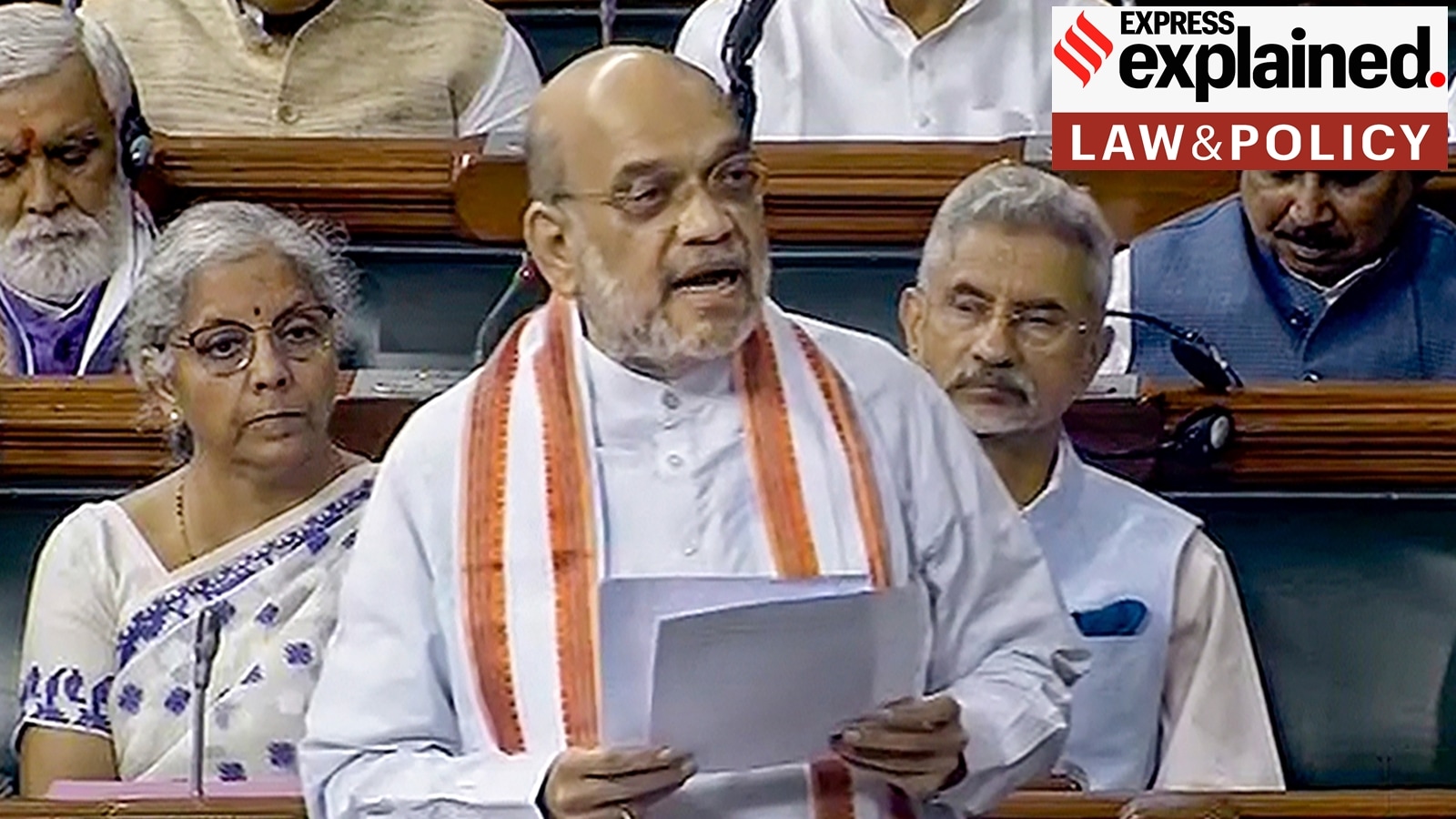The Bharatiya Nyaya Sanhita (BNS), the Bharatiya Nagrik Suraksha Sanhita (BNSS), and the Bharatiya Sakshya Adhiniyam (BSA), passed in Parliament last December, will replace the Indian Penal Code (IPC), 1860, the Criminal Procedure Code (CrPC), 1973, and the Indian Evidence Act, 1872 respectively.
Since Independence, the colonial-era IPC (which provides the substance of criminal law), CrPC (which provides the procedure for law’s enforcement), and Evidence Act have seen several revisions. But as Union Home Minister Amit Shah said during the new laws’ passage in Parliament, the sanhitas represented laws that had been framed by Indians, for Indians.
Even leaving aside the government’s ‘decolonisation’ narrative, there has been an overwhelming consensus that India’s criminal laws needed updating. At the same time, the consultation process during the pandemic for drafting the laws, and their hasty passage through Parliament, has caused much disquiet. Some legal experts opine that although the new laws make significant changes, they do not ‘overhaul’ the existing laws.
New crimes in BNS
The BNS introduces a handful of new crimes. Notable among them is Clause 69, which penalises sexual intercourse through the employment of “deceitful means”.
The provision reads: “Whoever, by deceitful means or by making promise to marry to a woman without any intention of fulfilling the same, has sexual intercourse with her… shall be punished with imprisonment” of upto 10 years, and also be liable for a fine. “Deceitful means” includes the false promise of employment or promotion, inducement, or marrying after suppressing identity. Critics say that this might, in some cases, end up criminalising consensual relationships and provide a fillip to the “love jihad” narrative.
Story continues below this ad
The BNS, under Clause 103, for the first time also recognises murder on the ground of race, caste, or community as a separate offence. The SC had, in 2018, directed the Centre to consider a separate law for lynching. The new provision could now ensure such crimes, which have been on the rise in recent years, get legal recognition.
Another big-ticket addition to the BNS is the inclusion of offences such as organised crime and terror, previously in the ambit of specific stringent laws like Unlawful Activities Prevention Act for terrorism, and state-specific laws such as the Maharashtra Control of Organised Crime Act for organised crime. On terrorism, the BNS borrows heavily from the UAPA. Organised crime, in Clause 111(1), encompasses “any continuing unlawful activity including kidnapping, robbery, vehicle theft, extortion, land grabbing, contract killing, economic offences, cyber-crimes having severe consequences, trafficking in people, drugs, illicit goods or services and weapons, human trafficking racket for prostitution or ransom…” But vague descriptions such as “cyber-crimes having severe consequences” will have to be addressed.
Snatching, defined in Clause 304(1), is also a ‘new’ crime, distinct from theft. The definition reads: “in order to commit theft, the offender suddenly or quickly or forcibly seizes or secures or grabs or takes away from any person or from his possession any moveable property”. Both theft and snatching prescribe a punishment of upto three-years in jail.
The rearrangement of provisions in the BNS signals legislative intent. Like the IPC, it starts with chapters dealing with general exceptions, punishments, abetment, and the Right of Private Defense. Offences against the state comes before offences against women and offences against body. But in the BNS crimes against women, comes before in Chapter V before offences against the state (like sedition).
New timelines, processes
Story continues below this ad
A big change in the BNSS is the expansion of detention in police custody from the 15-day limit in the CrPC to up to 90 days.
According to Section 167(2) of the CrPC, an accused had to be sent to judicial custody (prison) after a maximum of 15 days in police custody. This was intended to incentivise the police to complete investigations in a time-bound manner, and curtail the likelihood of custodial torture and forced confessions. Clause 187(3)of the BNSS has deleted the words “otherwise than in police custody,” essentially, allowing the police to keep custody of an accused for upto 90 days for all offences listed in the BNS.
Shah had said in Parliament that the BNSS takes a “victim-centric” approach by bringing in tighter timelines for the completion of trials (refer to box). The BNSS also states that in cases where the punishment is seven years or more, the victim shall be given an opportunity of being heard before withdrawal of the case by the government.
Trials in absentia — where a person accused of a crime can be tried and convicted in his absence, as if he was present in court and has waived his right to a fair trial for all offences — are another new introduction in the BNSS. While such a provision already exists under the UAPA, the burden of proof is reversed in the terror law, i.e. the onus is on the accused to prove himself not guilty, rather than the state to prove his guilt. Critics argue that the introduction of trials in absentia under normal criminal law allows the state to forgo its duty to properly locate the accused before the trial begins.
Story continues below this ad
The BNSS also removes the provision for statutory bail if an accused has more than one offence against his name. Under the CrPC, an accused could be granted statutory bail if he has served at least half of the maximum sentence prescribed for the offence. This was to ensure that trials do not take forever, and when they do, the accused does not suffer continued incarceration for no fault of his. This is how the Delhi High Court granted bail to JNU student Sharjeel Imam last month.
The upside
Among key positive changes in the new laws is the introduction of community service as an alternate form of punishment for some offences. These include small theft, defamation, and attempt to die by suicide with an intention to keep a public official from discharging her duty.
While it is unclear how offences deserving no jail time were chosen, with three-fourths of India’s prison population being undertrials, community service as punishment keeps first-time convicts and those convicted for minor offences out of prison. The BNS, however, does not define what constitutes community service, leaving it to the discretion of judges.
Also, sexual intercourse with a minor wife has been brought under the ambit of rape. The IPC had carved out only one exception for marital rape — intercourse with wife who is less than the age of 15 years. In 2017, the SC had held that this 15 year limit was at odds with child rape laws under the POCSO Act. The new law addresses the grey area that 15-18 year old married girls fell in, under the IPC.
Story continues below this ad
The inclusion of offences for mob-lynching is crucial, and signals a legislative acknowledgement of such hate crimes. The emphasis on video-conferencing of trials, and prescription of timelines for speedy trials should improve justice delivery but their success will depend on implementation on the ground.
Remaining grey areas
Among the big announcements made by the government on the three laws was “doing away with sedition.” This was crucial since it came over a year after the SC in May 2022 virtually stalled the operation of sedition law deeming it “prima facie unconstitutional.”
Despite the government’s claims, the BNS has in fact introduced the offence with a wider definition, while incorporating the SC guidelines in the 1962 Kedarnath Singh case, which upheld the constitutional validity for the crime of sedition. In Hindi, the law carries out a simple name change — from rajdroh (rebellion against the king) to deshdroh (rebellion against the nation).
The other big concern, as the criminal laws are rolled out, is the issue of penalising rape in cases where the victims are male. The BNS, with a seemingly progressive outlook, entirely leaves out the contentious Section 377 of the IPC which criminalises “carnal intercourse against the order of nature”. In 2018, this provision had been read down by the apex court in its landmark Navtej Singh Johar v Union of India ruling to the extent that it criminalised consensual sex among adults, including those of the same sex.
Story continues below this ad
But Section 377 is still invoked to penalise non-consensual sex, and is often the only recourse in cases of rape of men (specific rape laws are applied in cases of women victims). With the exclusion of this provision in the BNS, and with rape laws still not made gender-neutral, there is little criminal recourse for male victims of sexual assault.








































